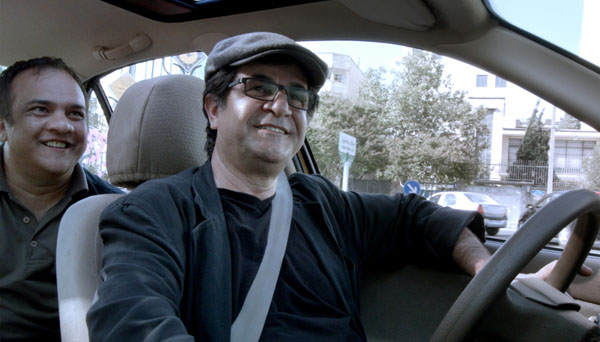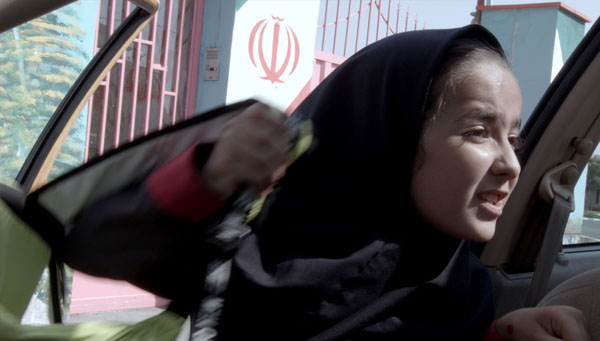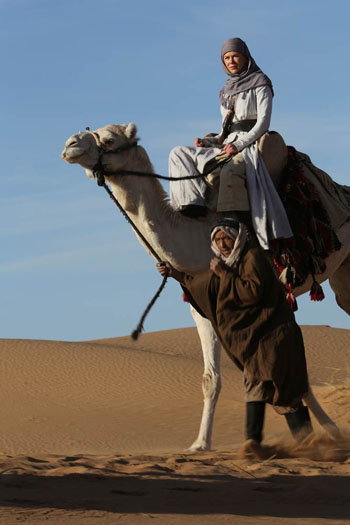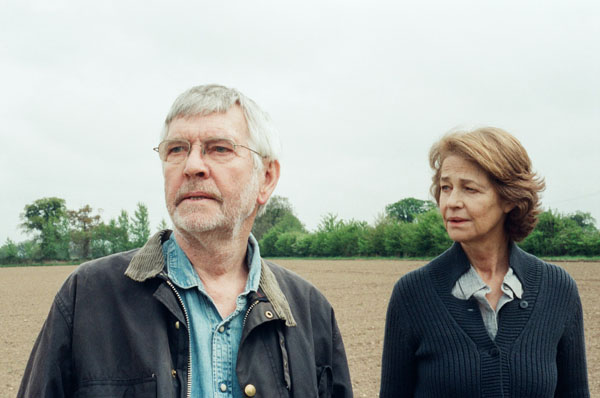No one would wish a 20-year ban on filmmaking on anyone, especially on a filmmaker as accomplished as Jafar Panahi. The question is whether anyone would dare to say that, as infuriating and unjust as the ban Iranian authorities slapped on Panahi in 2010 is, has it not inspired him to create a fresh round of remarkably innovative works? Panahi has made three films since the ban (which came packaged with a six-year jail sentence and further bans on contact with the media and travel abroad). The third, Taxi, which premiered today in Competition in Berlin, cranks the meta of This Is Not a Film (2011) to eleven and is as light and downright funny as Closed Curtain (2013) is dark and enigmatic.
The setup is simple; the execution can’t have been. Taxi opens with a view out onto the streets of Tehran through a windshield. The straightforward screen-within-a-screen shot holds steady and silent until a passenger waves the taxi down, gets in and, within seconds, strikes up an argument with a woman. The driver keeps his mouth shut as he executes the first pan, audibly swiveling the camera to take in a perfectly framed view of the hot-headed man in the passenger seat and a middle-class woman in the back seat. The point of contention between these passengers is the proper punishment for petty thieves. As Panahi makes clear in at least two more sequences, crime is on the rise in Iran as the economy is squeezed by prolonged international sanctions.
The driver is, of course, Jafar Panahi, who began his career as an assistant director for Abbas Kiarostami, and Taxi will draw inevitable comparisons with Kiarostami’s Ten (2002). But Taxi is decidedly a Panahi film—and one that could only have been made in the 2010s. Passengers come and go, and nearly all of them bring their cameras with them: smart phones, iPads, a nifty little Canon. By the time a wildly dramatic sequence kicks off fairly early on—there’s blood, the screams of an anguished wife, the pained oral delivery of a last will and testament, and tellingly, expert editing between Panahi’s stationary dashboard camera and the handheld footage shot on his phone—it’s quite clear that Taxi, as spontaneously improvised as it may have seemed at first, is painstakingly mapped, written, rehearsed, performed and filmed.
Structurally, Taxi is a marvel, but also as an entertainment, it delivers in every one of its 82 minutes. And of course, issues are addressed, at times subtly, at other times with hammer-to-nail bluntness. Panahi’s precocious niece has received a set of rules for proper filmmaking from her school and is prompted to ask, “What is ‘sordid realism’?” At one point, he gives his lawyer a lift—she’s another woman in a cast loaded with strong, independent women—and she looks into his dashboard camera and hands a rose to us, “the people of cinema.” Then, turning to her driver with a sly smile: “Don’t think for a moment I don’t know what you’re up to, Jafar.”
WHAT OTHERS ARE SAYING
“[T]his longtime alchemist of reality and fiction appears in full command of an exciting new mode of filmmaking devised in answer to the stifling constraints on his creativity,” writes Kevin B. Lee for Indiewire. Taxi examines “how all of us relate to the images we take for granted and their role in defining what’s real, acceptable and valuable to us. These reasons alone make it an essential film of the year, if not the decade.”
Variety‘s Scott Foundas finds Taxi to be “a film of quiet but profound outrage, laughing on the surface, but howling in anger just beneath.” More from Dan Fainaru (Screen), Peter Bradshaw (Guardian, 4/5) and Deborah Young (Hollywood Reporter).
Updates, 2/11: “That the director’s first of these smuggled features, This Is Not a Film (2011), is the best of the three he’s made and to my mind they’ve slowly decreased in quality… ultimately tells little of how instantly touched I am by these movies,” writes Notebook editor Daniel Kasman. “How the first image of Taxi, and the very first appearance by Jafar Panahi in the movie… by just the appearance of this man still existing, still being there and creating, how this moves me. That and his smile, this perennial smile he has on his face in Taxi, a smile of tolerance and warmth, a defense covering suppressed pain, and above all an embracing enjoyment of people, of traveling and seeing and hearing people.”
“This is a great film, one that, with minimal means, creates a sophisticated formal system that Panahi flourishes in and in such a way that for me surpasses Closed Curtain,” adds Adam Cook.
“Taxi is a perfect complement to its predecessors, adding another chapter to Panahi’s exceptional and thoroughly stirring exercise in meta-filmmaking,” writes Giovanni Marchini Camia at the Film Stage.
“Taxi isn’t a mere topical polemic,” writes Kenji Fujishima at the House Next Door. “His interest in the state of Iranian cinema today is bound up with his interest in cinema as a whole.”
More from Tarah Judah (desistfilm) and Jessica Kiang (Playlist, B+).
Updates, 2/15: Golden Bear!
Now then, Michael J. Anderson: Taxi “continues the director’s career-spanning emphasis on off-camera space, again as a product of his debt to Kiarostami, which in this case finds expression in characters who can be heard (or even sensed) but not seen, and conversations that occur beyond the mic of the camera (from a visual position inside Panahi’s stopped taxi cab, be it on the dashboard or from his younger niece’s camera). Panahi also refreshes one of his mentor’s greatest scenes, the famed closed passage of Through the Olive Trees (1994), a film for on which Panahi served as assistant director: at a spring, in which a pivotal humanistic gesture is about to occur, Panahi and his niece outside of the camera’s field of vision, thus leaving it to the spectator to finish the scene. Of course, Panahi finishes this same scene in a very different manner consequently, one that lacks the humanistic redemption that the film’s comic narrative is leading us towards. It should be noted, moreover, that the post-Kiarostami unfinished humanistic cinema is, in this case, re-purposed as a challenge to ‘distributable’ Iranian cinema, which does not allow for the absence of moralistic redemption, let alone moral turpitude.”
“When Panahi picks up his whip-smart young niece toting her own movie camera, what seemed at first a gentle tribute to Kiarostami’s 10 reaches near meta-parody levels,” writes Sight & Sound editor Nick James, “but by the end the deft touches of Woody Allen-esque clumsiness and whimsy make this film distinctly Panahi’s own.”
“In the best possible scenario,” suggests the Voice‘s Stephanie Zacharek, “Panahi will soon be free to make the types of movies he should be making—polished, emotionally textured feats of storytelling that address something other than his own victimization. As enjoyable and ruefully cheerful as Taxi is, he’s run that theme into a dead end.”
Updates, 2/21: The Guardian‘s Ben Beaumont-Thomas reports that Panahi, upon learning of the Golden Bear, has said that “’no prize is worth as much as my compatriots being able to see my films.’ In an interview with Iranian media following his win, Panahi said: ‘I’m really happy for me and for Iranian cinema,’ but took the opportunity to decry the Iranian government. ‘The people in power accuse us of making films for foreign festivals. They hide behind political walls and don’t say that our films are never authorised for screening in Iranian cinemas.'”
For Andrew J. Simpson at Movie Mezzanine, the “best moment of all” in Taxi “comes when the man recording the injured man’s will turns out to be an illegal DVD salesman, promising to get Panahi a copy of Nuri Bilge Ceylan’s Once Upon a Time in Anatolia. A wry nod to the way that many films, not least his own, are seen in Iran, it’s a point of grave concern, as well as vibrant humour; the apotheosis of another hallmark film in the career of a great filmmaker, and a resolute symbol of defiance.”
BFI programmer Geoff Andrew notes that “though the film touches on ethics, politics and aesthetics, the tone is frequently playful, with gags and sly reminders that film, for better or worse, trades in illusion.”
As we were walking out of this afternoon’s screening of Queen of the Desert, Andrew Grant summed it up pretty damn well, I think: If the film had been stripped of its credits, would you ever have guessed that it’d been made by Werner Herzog?
On further reflection, we should break “made” down to its constituent parts. “Directed”: Well, there’s very definitely one longish shot and maybe two or three other bits here and there that break with the conventions of mainstream prestige filmmaking. But that’s about it. “Written” (a): The story is one long meandering journey of a headstrong woman into a desolate and punishing landscape where she learns to appreciate the ways and the worldview of the people who’ve mastered it—quite a bit like Isabel Coixet’s Nobody Wants the Night, in other words, though, of course, much, much better straight across the board.
“Written” (b): As a group of wayward critics gathered outside the theater after the screening, one noted that several lines of dialogue might have been stomached more easily read off the page rather than heard delivered by some of the actors up there on the screen. I suggested that Herzog should have dubbed everyone (and someone quipped, “He dubbed the camels”). Point being, it’s difficult to make sincere wonder or blanket statements on politics and culture devoid of all irony convincing if your voice hasn’t got the shadowy weight Herzog’s has.
The aforementioned headstrong woman is, of course, archeologist and, eventually, foreign policy advisor Gertrude Bell. And Nicole Kidman acts circles around everyone else, even as she remains, throughout all those years out there in the desert winds, porcelain-featured Nicole Kidman. Everyone I’ve talked with agrees that we’d need less time spent on what amounts to a way overlong prologue in which Gertrud falls for James Franco’s diplomat in Tehran—that said, I, no Franco fan by any means, do think that, given more than a few utterly ridiculous lines to speak, he offers a few not uninteresting readings.
Queen has its moments. I hope Herzog’s next project is a documentary. I’ve met a few others who agree, plus two or three others who find it thoroughly meh, one strong advocate and a good handful who deem it an outright failure.
WHAT OTHERS ARE SAYING
“From his first shot, Robert Pattinson, as T.E. Lawrence, is hysterically miscast and bad, but he’s also redeemingly cheeky,” finds the Telegraph‘s Tim Robey. “The film is amusingly top-heavy with its smooching trysts, star power and extravagant desert vistas. The danger of this approach is keeping it up: when Herzog tries to explain the complexity of Bell’s career, her unusual influence in imperial policymaking and love of the Arab peoples, that soft, rumbling sound isn’t the shifting sands of a world order changing, but merely an audience nodding off.”
“And so the movie plods on,” sighs the Guardian‘s Peter Bradshaw. “Bell journeys out into that magnificent landscape, comes back, goes out, comes back.” More from Peter Debruge (Variety), Sophie Monks Kaufman (Little White Lies), Jessica Kiang (Playlist, C), and David Rooney in the Hollywood Reporter, where Alex Ritman interviews Herzog. Variety‘s Leo Barraclough reports on the press conference.
Updates, 2/11: “To point out that in its first minutes Queen of the Desert presents a 1902 in which Queen Victoria is still alive—the Empress kicked the bucket in January 1901—is, presumably, to succumb to the narrow-mindedness of the beancounter,” grants Neil Young at Indiewire. “But if Herzog is going to be so cavalier about such details, why does he punctuate his film with so many datelines—specific years, places, ‘three months later,’ and so on—and give the whole thing a tawdry, old-fashioned TV movie air? And if the ‘accountant’s truth’ is to be eschewed, wouldn’t it be a good idea to instead deliver a bit of his preferred alternative, ‘ecstatic truth’?”
“Herzog, who has ridden unchecked on the coattails of his own reputation—as a visionary documentarian with a cool voice, a knack for bringing equally oddball individuals to the big screen, and an investment in things known or referred to as ecstatic truths—was presumably drawn to Bell because of her startling life arc,” suggests Michael Pattison at RogerEbert.com. “But the paint-by-numbers feel of this biographical overview never threatens to dig deeper.”
“By the end of Queen of the Desert, one may well be surprised to learn about how influential [Bell] in fact was to British foreign policy, since Herzog lavishes so little attention on her actual achievements,” writes Kenji Fujishima at the House Next Door. “All the film adds up to, unfortunately, is a sweeping romantic epic made with barely any persuasive romantic feeling underpinning it.”
More from David D’Arcy (Screen), Jordan Raup (Film Stage, B-) and Andrew J. Simpson (Movie Mezzanine).
Updates, 2/15: “I must admit my profound disappointment at Herzog’s first fictional feature film since his two-shot salvo of The Bad Lieutenant: Port of Call New Orleans and My Son, My Son, What Have You Done? in 2009 and certainly his most expansive drama for decades,” writes Notebook editor Daniel Kasman. And “for a director so adept at discovering, eliciting and pursuing a kind of inspired mania and adventurousness in his fellow man, coming across his first female heroine Herzog stumbles. Or perhaps coming across Nicole Kidman, a force of will in the film similar to that of Isabelle Huppert‘s presence in Claire Denis‘s White Material: a female actress whose persona and process is so strong that it actively fights the efforts of the director. While White Material ultimately feels like a compromise between actress and directress, in Queen of the Desert Kidman wins: it is she who sets the tone of dignified perseverance in her character and in the film’s story.”
“Revealing how uncertain he is with his material, Herzog reverts to melodrama, producing what may be the twenty-first century’s first major cinematic example of high camp,” suggests Travis Jeppesen, writing for Artforum.
“It is as though,” Michael J. Anderson adds, “Herzog no longer has any interest or patience in making conventionally good films, but is instead enthralled by the thrills of the awful and of bad taste.”
Writing for The Credits, Susannah Edelbaum notes that Queen “omits her real-life role as a clandestine intelligence agent for the British Empire… So why did Herzog choose to make a film about Bell, Lawrence of Arabia’s much less famous mentor, if he wasn’t going to show her in a politically accurate light?” She notes that, at the press conference, Herzog “conveyed his interest in portraying Bell’s ‘interior life, which was much more fascinating’ than the political endeavors and ‘complications’ of her later years.”
Andrew Haigh tells Screen‘s Wendy Mitchell that he sees his new feature, 45 Years, and his 2011 breakthrough, Weekend, as “companion pieces; Weekend is the first flourishes of love and this is about a relationship years later.” I remember walking into a SXSW screening of Weekend cold, knowing nothing of either Haigh or his two leads, Tom Cullen and Chris New, and walking out convinced that all three were outstanding talents aching to be discovered. No convincing necessary, of course, walking into 45 Years. Haigh, Charlotte Rampling, Tom Courtenay: My expectations were high. And they were met.
45 Years is based on a short story, David Constantine’s “In Another Country,” and Haigh, who wrote the adaptation, gives it room to breathe. Kate Mercer (Rampling), a retired teacher in her mid-to-late 60s, is preparing—and somewhat dreading—a 45th anniversary party in the town near her home in the English countryside. Her husband Geoff (Courtenay), early-to-mid 70s, is playing along at best. With a week to go before the big day, he receives a letter informing him that the frozen corpse of an early flame has been revealed by the melting of a glacier in Switzerland.
Geoff is rattled; Kate is all sympathy and patience—until Geoff (with a slip of the tongue?) refers to the woman forever frozen in youth as “my Katya.” And each succeeding day, marked off by title cards, brings to Kate’s naturally curious eyes further hints that the relationship, dating back 50 years and cut short well before she and Geoff met, has meant more to him, then and now, than he’s ever let on.
Courtenay gives Geoff, once a rowdy and outspoken Labor supporter, a poignant fragility as his body and mind begin to slip. As Kate, the anchor of both the film and the marriage, Rampling proves herself to be a master of communicating a thousand words per second simply by thinking them. The torrent of rapidly changing and conflicting emotions may be all but invisible, but we know they’re there.
Updates, 2/11: Adam Cook in the Notebook: “Not over-serious in tone but quietly dramatic, and beautifully shot, the questions at the film’s core mean business: can even a love so strong and time-tested be undone by the past? What are the consequences of discretion between partners? Is having one’s heart broken the same at 17 and 70? I was moved and even startled by 45 Years, especially when it culminated, as great films sometimes do, in a brilliant last shot that hints at new developments and reframes how we examine what precedes it.”
“Courtenay, in particular, gives us what might actually be his finest hour,” suggests the Guardian‘s Peter Bradshaw. “The couple’s lives together are shown in dialogue scenes interleaved with silent panoramic shots of the vast and slightly featureless East Anglian landscape; these do not cleanse the palate exactly, but add to the growing unease. The emotional disquiet builds like an orchestral crescendo from near-silence to a roar.”
More from Stephen Dalton (THR), Charles Gant (Variety), Jessica Kiang (Playlist, A), Eric Kohn (Indiewire, A-), Bénédicte Prot (Cineuropa) and Anna Tatarska (Movie Mezzanine). Interviews with Haigh: Fabien Lemercier (Cineuropa) and Nigel M. Smith (Indiewire).
Updates, 2/15: “While deploying considerable restraint in displaying his characters’ psychological complexity, 45 Years is perhaps too rote an instance of British social-realist filmmaking,” suggests Travis Jeppesen, writing for Artforum.
“While I did find one or two grace notes in the first 20 minutes rang untrue,” grants Sight & Sound editor Nick James, “the rest of the film is a display of fine acting and quiet observation on a restrained cinematic scale that’s as unshowy, subtle and effective as Haigh’s surprise hit Weekend.”
“Though highly accomplished, Weekend nevertheless suffered from a tendency towards commenting on itself as a gay issues film, which at times overrode the otherwise compelling realism,” writes Giovanni Marchini Camia at the Film Stage. “Despite treating material arguably even more underrepresented in cinema—senior relationships—Haigh avoids this same self-reflexive pitfall in 45 Years, pulling off an incisive and emotionally ensnaring tour de force.”
Kenji Fujishima at the House Next Door: “Basically a showcase for Haigh’s finely tuned screenplay and the performances of its two leads, 45 Years is arguably above all Rampling’s show: We’re meant to see the enigmatic aspects of Courtenay’s character through Kate’s curious perspective, and Rampling reveals her character’s increasingly obsessive frustration with a vivid emotional transparency that explodes, to quietly devastating effect, in an extended final shot.”
“45 Years is a beautiful and heartbreaking film, showing two consummate actors at their best,” writes Shelagh Rowan-Legg at Twitch.
And Courtenay and Rampling have each won best acting Silver Bears.
Sundance Selects has acquired North American rights, reports Variety‘s Dave McNary.
Updates, 2/21: For BFI programmer Geoff Andrew, “the film is a wry, witty, wonderfully true-to-life drama notable not only for its superb performances but also for the subtlety of its script and direction. Also impressive for its expressive use of Norfolk’s landscape and weather, it comes across a little like late Bergman—but with rather more laughs. For me at least, it’s one of the finest British films of recent years.”
“Haigh marshals the tension carefully, well served by Courtenay, physically and emotionally dishevelled, and Rampling, infinitely f







